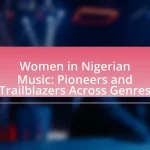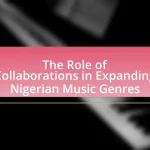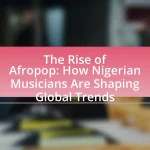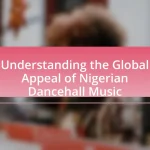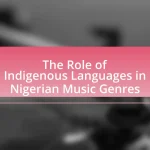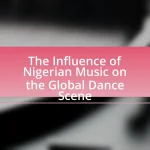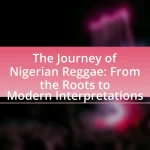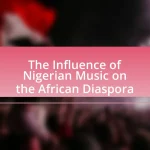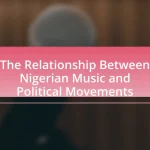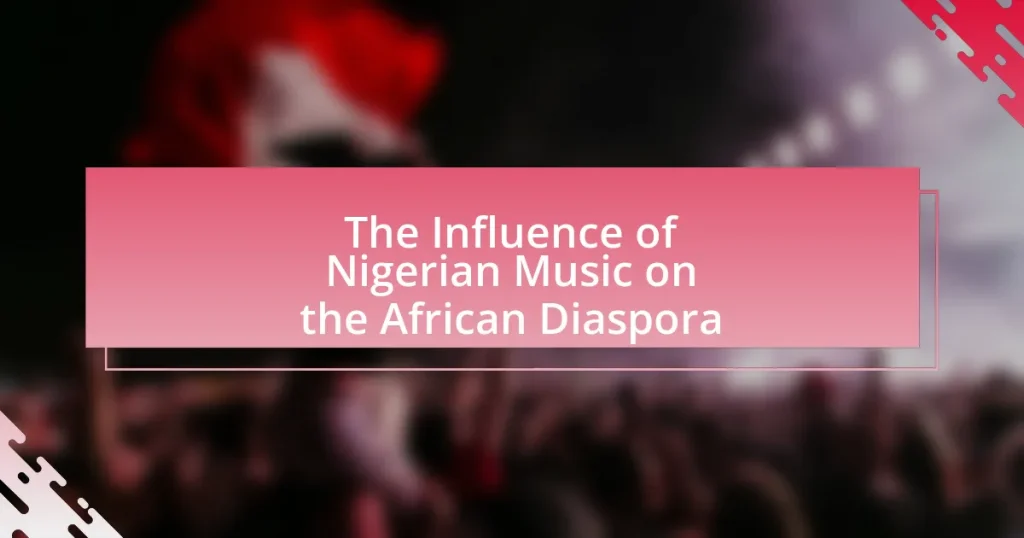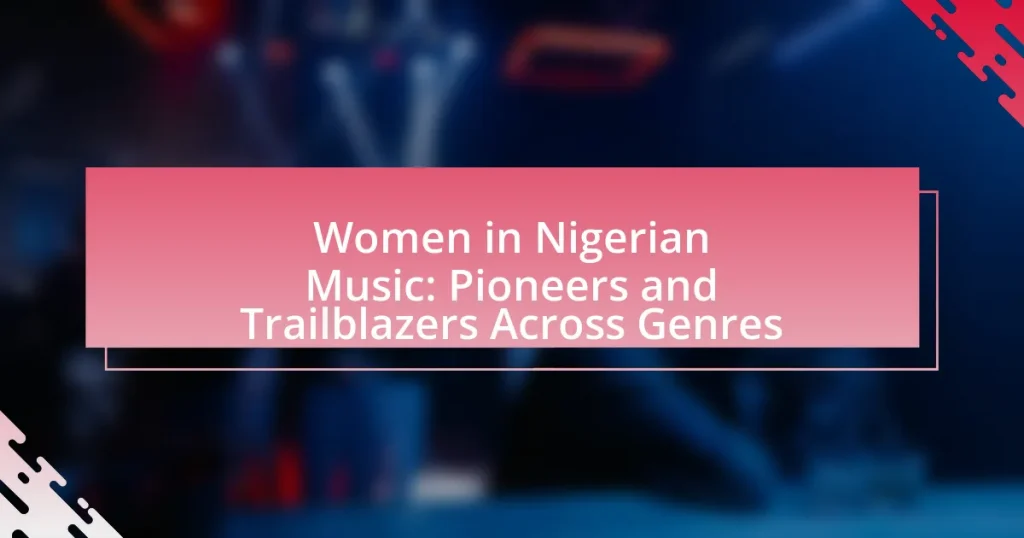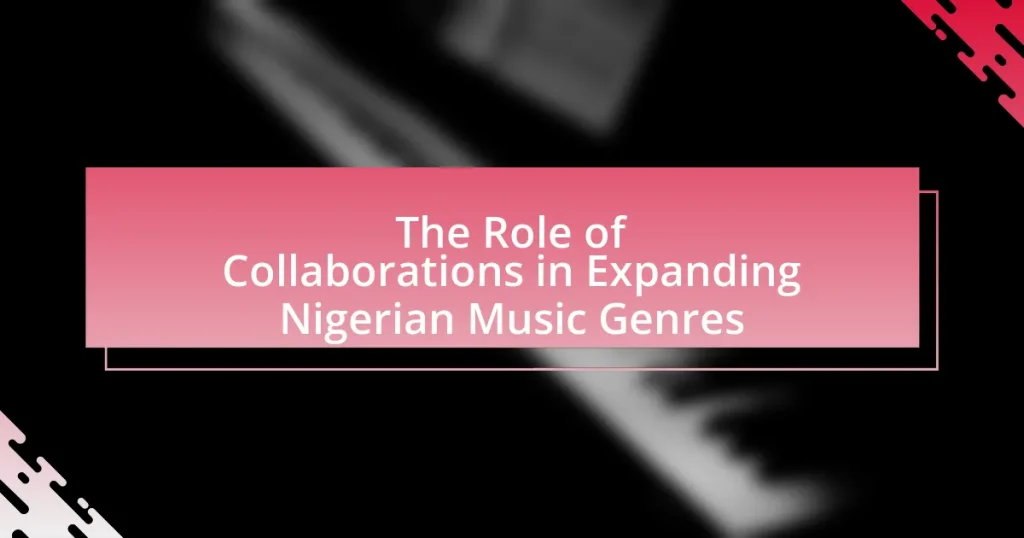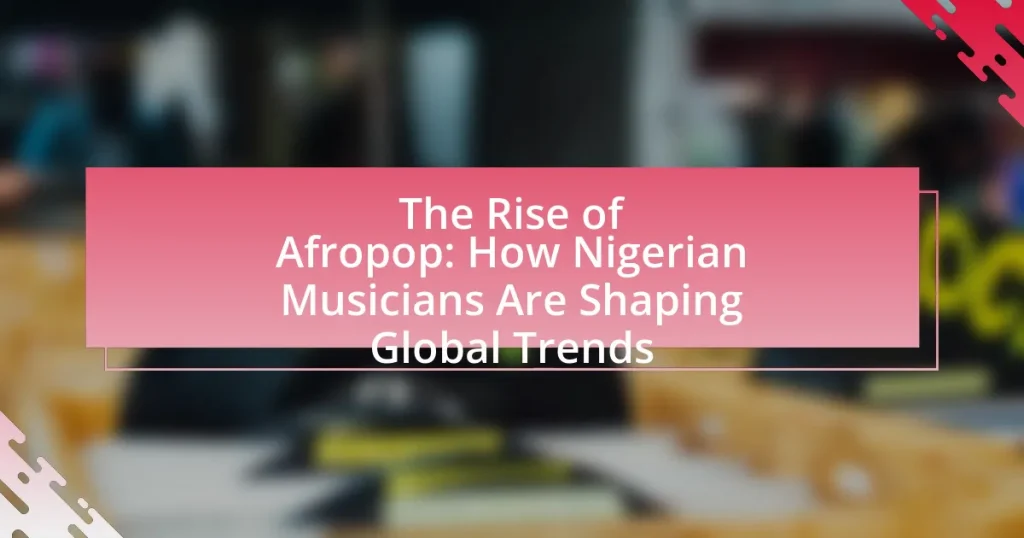The article examines the significant influence of Nigerian music on the African Diaspora, highlighting how genres such as Afrobeats, highlife, and traditional music shape cultural identity and foster community connections among African descendants worldwide. It discusses the evolution of Nigerian music from traditional forms to contemporary styles, the key genres that have emerged, and the cultural themes that resonate with the diaspora experience. Additionally, the article explores the role of Nigerian music in promoting cultural exchange, preserving African heritage, and the challenges faced by artists in reaching global audiences. It also outlines practical ways individuals can engage with and support Nigerian music within the diaspora.
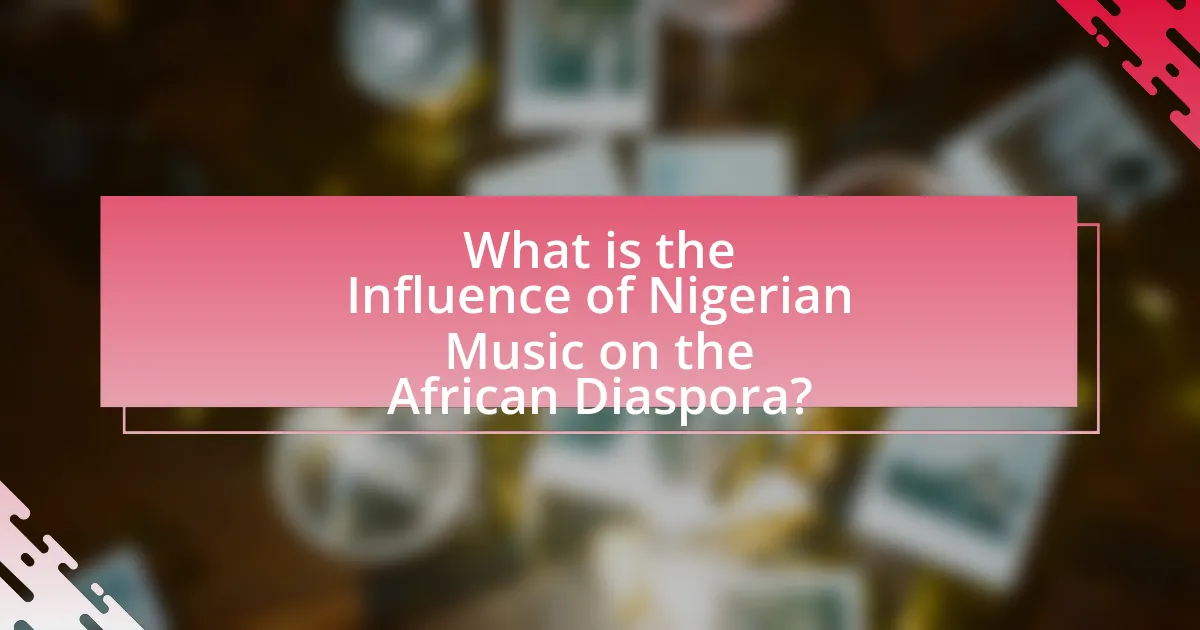
What is the Influence of Nigerian Music on the African Diaspora?
Nigerian music significantly influences the African Diaspora by shaping cultural identity and fostering community connections. Genres such as Afrobeats, highlife, and traditional music have transcended borders, becoming integral to social events, celebrations, and cultural expressions within African communities abroad. For instance, the global popularity of artists like Burna Boy and Wizkid has led to increased interest in Nigerian music and culture, promoting a sense of pride and belonging among the diaspora. Additionally, Nigerian music often incorporates themes of resilience and unity, resonating with the experiences of African descendants worldwide, thus reinforcing cultural ties and shared heritage.
How has Nigerian music evolved over the years?
Nigerian music has evolved significantly over the years, transitioning from traditional forms to contemporary genres like Afrobeats and hip-hop. Historically, Nigerian music was characterized by indigenous styles such as Highlife and Juju, which incorporated local rhythms and instruments. In the late 20th century, the emergence of Afrobeat, popularized by Fela Kuti, introduced a fusion of jazz, funk, and traditional African music, influencing global music trends.
The 21st century saw the rise of Afrobeats, a genre that blends various musical influences and has gained international acclaim, with artists like Burna Boy and Wizkid achieving global recognition. This evolution reflects not only changes in musical styles but also the impact of technology and globalization, which have facilitated the spread of Nigerian music across the African diaspora and beyond. The Nigerian music industry has grown into a multi-billion-dollar sector, contributing to cultural exchange and shaping musical landscapes worldwide.
What are the key genres of Nigerian music that have emerged?
The key genres of Nigerian music that have emerged include Afrobeats, Highlife, Juju, and Fuji. Afrobeats, characterized by its fusion of various musical styles, has gained international popularity, with artists like Burna Boy and Wizkid leading the charge. Highlife, originating from the early 20th century, blends traditional African rhythms with jazz influences. Juju music, popularized by artists such as King Sunny Adé, incorporates traditional Yoruba music with modern instruments. Fuji, rooted in Islamic culture, combines traditional Yoruba music with contemporary sounds and has a strong following in Nigeria. These genres reflect Nigeria’s rich cultural diversity and have significantly influenced music across the African diaspora.
How do cultural influences shape the evolution of Nigerian music?
Cultural influences significantly shape the evolution of Nigerian music by integrating diverse musical traditions, languages, and social practices. The rich tapestry of Nigeria’s ethnic groups, including the Yoruba, Igbo, and Hausa, contributes unique rhythms, instruments, and vocal styles, which blend to create various genres such as Afrobeats, Highlife, and Juju. Historical interactions, such as the transatlantic slave trade, introduced African musical elements to the Americas, further evolving Nigerian music through diaspora influences. Additionally, globalization and technology have facilitated the fusion of traditional Nigerian sounds with contemporary genres like hip-hop and electronic music, reflecting both local and global cultural trends. This dynamic interplay of cultural elements ensures that Nigerian music continues to evolve while maintaining its roots.
Why is Nigerian music significant in the context of the African Diaspora?
Nigerian music is significant in the context of the African Diaspora because it serves as a cultural bridge that connects African heritage with global audiences. The rise of genres like Afrobeats has led to increased visibility and appreciation of African culture, influencing artists worldwide and fostering a sense of identity among the diaspora. For instance, Nigerian artists such as Burna Boy and Wizkid have achieved international acclaim, with Burna Boy winning a Grammy Award for Best World Music Album in 2021, showcasing the global impact of Nigerian music. This cultural exchange not only enriches the musical landscape but also reinforces the shared experiences and histories of people of African descent across the globe.
What role does Nigerian music play in cultural identity for the diaspora?
Nigerian music serves as a vital connector of cultural identity for the diaspora, reinforcing a sense of belonging and heritage. Through genres like Afrobeat and Highlife, Nigerian music encapsulates traditional rhythms, languages, and narratives that resonate with the experiences of Nigerians living abroad. This music often evokes nostalgia and pride, allowing individuals to maintain ties to their roots while navigating life in foreign environments. Studies indicate that diaspora communities frequently engage with Nigerian music during cultural celebrations and social gatherings, which fosters community cohesion and cultural transmission. For instance, the global popularity of artists like Burna Boy and Wizkid has not only elevated Nigerian music on the world stage but also strengthened the cultural identity of Nigerians in the diaspora by providing a shared musical experience that reflects their heritage.
How does Nigerian music facilitate connections among African diaspora communities?
Nigerian music facilitates connections among African diaspora communities by serving as a cultural bridge that fosters shared identity and collective experiences. The rhythms, languages, and themes found in Nigerian music resonate with the historical and cultural narratives of African descendants worldwide, creating a sense of belonging. For instance, genres like Afrobeats and Highlife incorporate traditional African sounds and contemporary influences, appealing to diverse audiences and encouraging communal participation in events such as music festivals and dance gatherings. These musical expressions often evoke nostalgia and pride, reinforcing cultural ties and facilitating social interactions among individuals from various backgrounds within the diaspora.
What are the main characteristics of Nigerian music that resonate with the diaspora?
The main characteristics of Nigerian music that resonate with the diaspora include its rhythmic complexity, fusion of traditional and contemporary styles, and cultural storytelling. Nigerian music often features intricate polyrhythms and syncopation, which are appealing to listeners familiar with diverse musical traditions. The blending of genres such as Afrobeat, Highlife, and Juju with modern elements like hip-hop and R&B creates a dynamic sound that attracts a global audience. Additionally, the lyrical content often reflects themes of identity, struggle, and celebration, resonating with the experiences of the diaspora. For instance, artists like Burna Boy and Wizkid incorporate personal and collective narratives that connect with the African diaspora’s cultural heritage and contemporary realities.
How do rhythms and melodies in Nigerian music appeal to diverse audiences?
Rhythms and melodies in Nigerian music appeal to diverse audiences through their rich cultural heritage and infectious energy. The use of polyrhythms, which are prevalent in genres like Afrobeat and Highlife, creates complex layers that engage listeners from various backgrounds. Additionally, melodies often incorporate traditional instruments such as the talking drum and shekere, which resonate with both local and global audiences, fostering a sense of connection. The global popularity of Nigerian artists like Burna Boy and Wizkid, who blend traditional sounds with contemporary genres, exemplifies this appeal, as their music transcends cultural boundaries and attracts listeners worldwide.
What themes are commonly explored in Nigerian music that relate to the diaspora experience?
Common themes explored in Nigerian music that relate to the diaspora experience include identity, belonging, and cultural nostalgia. These themes reflect the struggles and triumphs of Nigerians living abroad, often addressing the challenges of maintaining cultural ties while adapting to new environments. For instance, songs frequently highlight the longing for home and the complexities of navigating dual identities, as seen in the works of artists like Burna Boy and Wizkid, who incorporate traditional sounds with contemporary influences to resonate with both local and global audiences. This blending of styles serves to affirm cultural heritage while also appealing to the diaspora’s experiences, illustrating the ongoing connection to Nigeria despite geographical distances.
How does Nigerian music influence contemporary artists in the diaspora?
Nigerian music significantly influences contemporary artists in the diaspora by shaping their musical styles, themes, and cultural expressions. This influence is evident in the incorporation of Afrobeat rhythms, highlife melodies, and traditional Nigerian instruments into various genres such as hip-hop, R&B, and pop. For instance, artists like Wizkid and Burna Boy have gained international acclaim, inspiring diaspora musicians to blend these elements into their work, thereby creating a fusion that resonates with both African and global audiences. The global success of Nigerian music, exemplified by Burna Boy’s Grammy win for “Twice as Tall,” underscores its impact, as it encourages artists worldwide to explore and integrate African sounds into their music, fostering a broader appreciation for Nigerian culture.
What are the channels through which Nigerian music reaches the diaspora?
Nigerian music reaches the diaspora primarily through digital streaming platforms, social media, and international collaborations. Digital streaming platforms like Spotify and Apple Music provide global access to Nigerian artists, allowing listeners worldwide to discover and enjoy their music. Social media platforms, such as Instagram and TikTok, facilitate the sharing of music and cultural content, enabling artists to connect with fans in the diaspora directly. Additionally, international collaborations with artists from other countries help to promote Nigerian music on a broader scale, increasing its visibility and influence. These channels collectively contribute to the growing popularity of Nigerian music among the African diaspora.
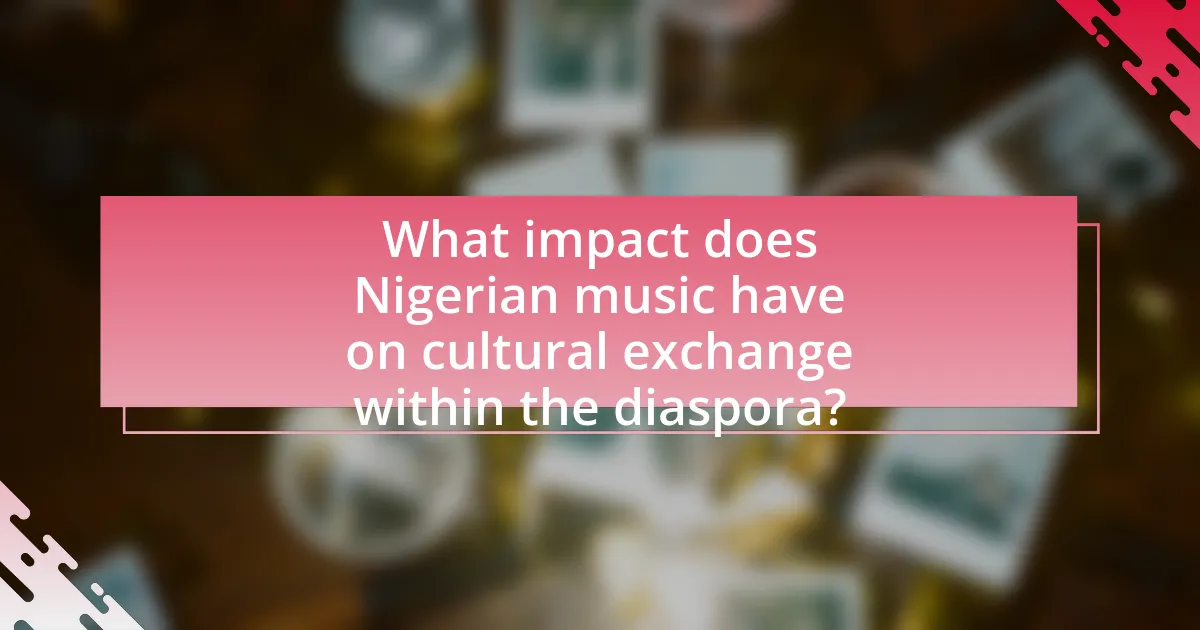
What impact does Nigerian music have on cultural exchange within the diaspora?
Nigerian music significantly enhances cultural exchange within the diaspora by fostering connections among diverse communities and promoting the sharing of cultural practices. The global popularity of genres like Afrobeats has led to increased collaboration between Nigerian artists and musicians from various backgrounds, exemplified by the rise of artists such as Burna Boy and Wizkid, who have achieved international acclaim. This cross-cultural collaboration not only introduces Nigerian rhythms and styles to a broader audience but also encourages the blending of musical traditions, as seen in the fusion of Afrobeats with hip-hop and R&B. Furthermore, events like the annual Afro Nation festival attract attendees from around the world, creating spaces for cultural dialogue and exchange. The impact of Nigerian music on cultural exchange is evident in its ability to transcend geographical boundaries, unite people through shared experiences, and enrich the cultural landscape of the diaspora.
How does Nigerian music contribute to the preservation of African heritage abroad?
Nigerian music plays a crucial role in preserving African heritage abroad by serving as a cultural bridge that connects the diaspora to their roots. Through genres like Afrobeats, highlife, and traditional folk music, Nigerian artists convey stories, traditions, and values that reflect the rich history of African cultures. For instance, the global popularity of artists such as Burna Boy and Wizkid has led to increased interest in African rhythms and narratives, fostering a sense of identity among African communities outside the continent. Additionally, music festivals and cultural events featuring Nigerian music promote awareness and appreciation of African heritage, allowing diaspora populations to engage with their cultural origins. This cultural exchange not only reinforces community bonds but also educates wider audiences about the significance of African traditions, thereby ensuring their continued relevance in a globalized world.
What events or festivals celebrate Nigerian music in the diaspora?
Events and festivals that celebrate Nigerian music in the diaspora include the Afro Nation festival, which showcases African music and culture, and the Lagos to London festival, highlighting Nigerian artists in the UK. Additionally, the New York African Film Festival often features Nigerian music as part of its programming, while the Nigerian Independence Day Parade in New York City celebrates Nigerian culture, including music performances. These events collectively emphasize the global influence and appreciation of Nigerian music, reflecting its significance in the cultural landscape of the diaspora.
How do educational programs incorporate Nigerian music into their curricula?
Educational programs incorporate Nigerian music into their curricula by integrating it into music education, cultural studies, and performance arts. These programs often include lessons on traditional Nigerian music genres such as Afrobeat, Highlife, and Juju, allowing students to explore the historical and cultural significance of these styles. For instance, universities in Nigeria and abroad may offer courses that analyze the impact of Nigerian music on global music trends, highlighting artists like Fela Kuti and Burna Boy. Additionally, workshops and performances featuring Nigerian musicians provide hands-on experience, fostering appreciation and understanding of the music’s role in social and political contexts. This approach not only enriches students’ musical knowledge but also promotes cultural awareness and diversity in educational settings.
In what ways does Nigerian music inspire fusion genres in the diaspora?
Nigerian music inspires fusion genres in the diaspora through its rhythmic complexity, diverse instrumentation, and cultural themes. The incorporation of Afrobeat, a genre pioneered by Nigerian musician Fela Kuti, has significantly influenced genres like hip-hop, jazz, and electronic music in various countries. For instance, artists such as Beyoncé and Drake have integrated Afrobeat elements into their music, showcasing the genre’s global appeal. Additionally, the use of traditional Nigerian instruments, such as the talking drum and shekere, in contemporary music has led to innovative sounds that blend African and Western musical styles. This fusion not only enriches the musical landscape but also fosters cultural exchange, as seen in the rise of artists in the diaspora who draw inspiration from Nigerian music to create unique hybrid genres.
What are some examples of fusion genres that blend Nigerian music with other styles?
Examples of fusion genres that blend Nigerian music with other styles include Afrobeats, which combines traditional Nigerian music with hip-hop, dancehall, and R&B elements. Another example is Naija pop, which merges Nigerian highlife and contemporary pop music. Additionally, Nigerian jazz incorporates indigenous rhythms with jazz improvisation, while Afro-fusion blends various African musical styles with global genres like reggae and funk. These genres reflect the dynamic cultural exchange and innovation within the Nigerian music scene, showcasing its influence on both local and international music landscapes.
How do artists from the diaspora reinterpret Nigerian music in their work?
Artists from the diaspora reinterpret Nigerian music by blending traditional elements with contemporary genres, creating unique fusions that reflect their cultural experiences. For instance, artists like Burna Boy and Wizkid incorporate Afrobeat rhythms into global music styles such as hip-hop and R&B, which broadens the appeal of Nigerian music. This fusion not only preserves the essence of Nigerian sounds but also introduces them to new audiences, as seen in Burna Boy’s Grammy-winning album “Twice as Tall,” which features collaborations with international artists and showcases Afrobeat’s global influence.
What challenges does Nigerian music face in the diaspora?
Nigerian music faces several challenges in the diaspora, including cultural misrepresentation, limited access to mainstream media, and competition from other genres. Cultural misrepresentation occurs when Nigerian music is often stereotyped or misunderstood, leading to a lack of appreciation for its diversity and richness. Limited access to mainstream media restricts the visibility of Nigerian artists, making it difficult for them to reach wider audiences compared to more established genres like hip-hop or pop. Additionally, competition from other musical styles can overshadow Nigerian music, making it harder for artists to gain recognition and support in foreign markets. These challenges hinder the growth and influence of Nigerian music within the global music landscape.
How do issues of commercialization affect the authenticity of Nigerian music?
Commercialization significantly undermines the authenticity of Nigerian music by prioritizing marketability over cultural expression. As artists increasingly cater to commercial interests, they often dilute traditional sounds and themes to appeal to broader audiences, leading to a homogenization of music styles. For instance, the rise of Afrobeats has seen many artists adopt Western production techniques and lyrical content, which can overshadow indigenous musical elements. This shift is evidenced by the increasing collaboration between Nigerian artists and international producers, which, while expanding reach, often compromises the unique cultural narratives that define authentic Nigerian music.
What barriers exist for Nigerian artists trying to reach diaspora audiences?
Nigerian artists face several barriers in reaching diaspora audiences, including limited access to international distribution channels, cultural differences, and inadequate marketing strategies. Limited access to platforms like streaming services can hinder their visibility, as many Nigerian artists struggle to secure deals with major distributors that can promote their music globally. Cultural differences may also affect the reception of their work, as diaspora audiences might have varying tastes and preferences influenced by their local environments. Additionally, inadequate marketing strategies often result in insufficient promotion of their music, making it difficult for these artists to connect with potential fans abroad.
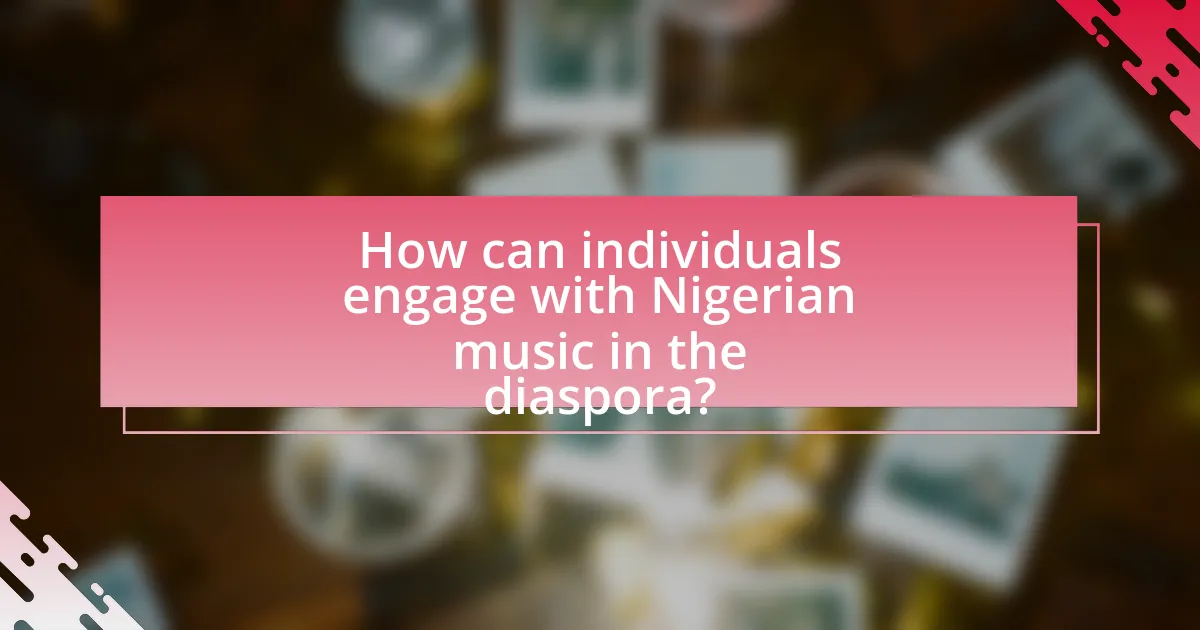
How can individuals engage with Nigerian music in the diaspora?
Individuals can engage with Nigerian music in the diaspora by attending live performances, participating in cultural festivals, and utilizing digital platforms for streaming and sharing music. Live performances, such as concerts and local events featuring Nigerian artists, provide direct interaction with the music and culture. Cultural festivals often showcase Nigerian music alongside traditional dance and art, fostering community engagement. Digital platforms like Spotify, Apple Music, and YouTube allow individuals to access a wide range of Nigerian music, enabling them to discover new artists and genres. According to a report by the International Federation of the Phonographic Industry, streaming services have significantly increased the global reach of Nigerian music, making it more accessible to audiences worldwide.
What resources are available for discovering Nigerian music?
Streaming platforms such as Spotify, Apple Music, and YouTube Music provide extensive libraries of Nigerian music, allowing users to explore various genres and artists. Additionally, websites like NotJustOk and Pulse Nigeria offer curated playlists, music reviews, and news about the Nigerian music scene. Social media platforms, particularly Instagram and Twitter, serve as vital resources for discovering new artists and trends, as many musicians actively promote their work there. Furthermore, music blogs and online magazines, such as OkayAfrica and The Native, feature articles and interviews that highlight emerging talents and cultural influences within Nigerian music. These resources collectively enhance the accessibility and visibility of Nigerian music for a global audience.
How can social media platforms enhance the experience of Nigerian music?
Social media platforms can enhance the experience of Nigerian music by providing artists with direct access to global audiences, facilitating real-time engagement and feedback. This direct interaction allows musicians to build a loyal fan base, as evidenced by the rise of Nigerian artists like Burna Boy and Wizkid, who gained international recognition through platforms like Instagram and Twitter. Additionally, social media enables the sharing of music videos, live performances, and behind-the-scenes content, which enriches the listener’s experience and fosters a deeper connection to the music. The viral nature of content on these platforms also helps in promoting Nigerian music trends, as seen with the global popularity of Afrobeats, which has been significantly propelled by social media sharing and user-generated content.
What role do streaming services play in promoting Nigerian music globally?
Streaming services play a crucial role in promoting Nigerian music globally by providing accessible platforms for artists to reach international audiences. These services, such as Spotify, Apple Music, and YouTube, enable Nigerian musicians to distribute their music widely, breaking geographical barriers. For instance, in 2020, Nigerian artists like Burna Boy and Wizkid gained significant recognition on global charts, with Burna Boy’s album “Twice as Tall” nominated for a Grammy, showcasing the impact of streaming on their international visibility. Additionally, streaming platforms often feature curated playlists that highlight African music, further enhancing exposure and engagement with global listeners.
What are some practical ways to support Nigerian music artists in the diaspora?
Supporting Nigerian music artists in the diaspora can be effectively achieved through several practical methods. First, individuals can promote their music by sharing it on social media platforms, which increases visibility and engagement; for instance, platforms like Instagram and TikTok have proven to amplify artists’ reach significantly. Second, attending live performances and events featuring Nigerian artists fosters community support and provides financial benefits to the artists. According to a report by the International Federation of the Phonographic Industry, live music events contribute substantially to artists’ income, especially in the diaspora. Third, purchasing music and merchandise directly from artists ensures they receive a larger share of the revenue, as streaming platforms often take a significant cut. Lastly, collaborating with local artists or influencers can help Nigerian musicians tap into new audiences, enhancing their presence in the music industry.
How can attending live performances contribute to the growth of Nigerian music?
Attending live performances significantly contributes to the growth of Nigerian music by enhancing audience engagement and fostering cultural exchange. Live events create immersive experiences that allow audiences to connect emotionally with the music and artists, leading to increased popularity and demand for Nigerian music both locally and internationally. For instance, the rise of Afrobeats has been largely driven by live performances, with artists like Burna Boy and Wizkid gaining global recognition through sold-out concerts and festivals. These performances not only showcase the talent of Nigerian musicians but also promote collaboration with international artists, further expanding the reach and influence of Nigerian music.
What are the benefits of participating in Nigerian music workshops or classes?
Participating in Nigerian music workshops or classes enhances musical skills, cultural understanding, and networking opportunities. These workshops provide hands-on experience with traditional instruments and techniques, allowing participants to develop their musical abilities in a structured environment. Additionally, they foster a deeper appreciation for Nigeria’s rich musical heritage, which includes genres like Afrobeat and Highlife, thereby promoting cultural exchange. Networking with fellow musicians and instructors can lead to collaborations and performance opportunities, further enriching participants’ artistic journeys.
